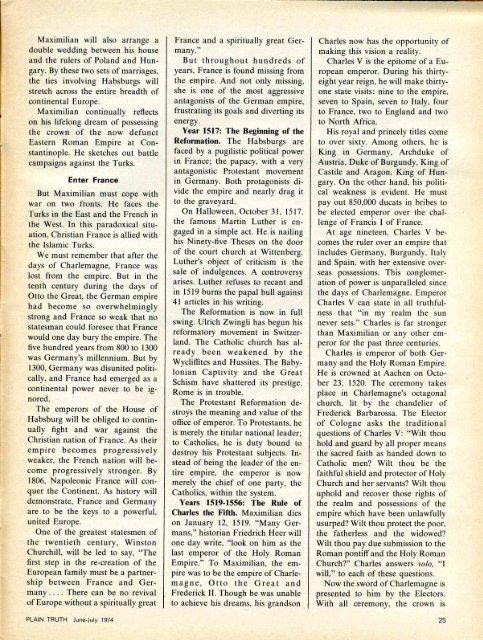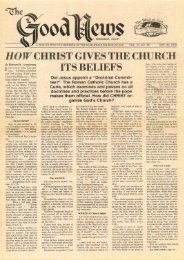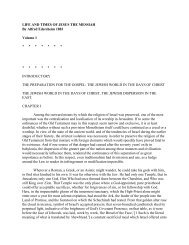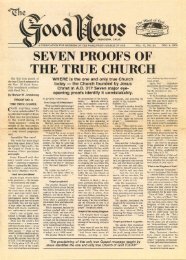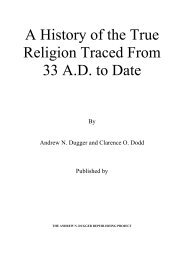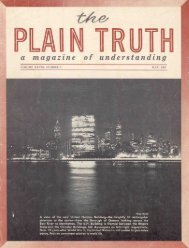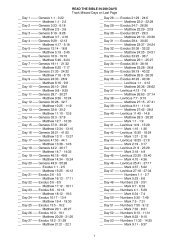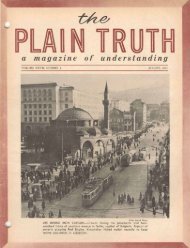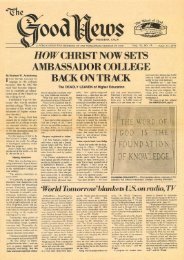You also want an ePaper? Increase the reach of your titles
YUMPU automatically turns print PDFs into web optimized ePapers that Google loves.
Maximilian will also arrange a<br />
double wedding between his house<br />
and the rulers of Poland and Hungary.<br />
By these two sets of marriages,<br />
the ties involving Habsburgs will<br />
stretch across the entire breadth of<br />
continental Europe.<br />
Maximilian continually reflects<br />
on his lifelong dream of possessing<br />
the crown of the now defunct<br />
Eastern Roman Empire at Constantinople.<br />
He sketches out battle<br />
campaigns against the Turks.<br />
Enter France<br />
But Maximilian must cope with<br />
war on two fronts. He faces the<br />
Turks in the East and the French in<br />
the West. In this paradoxical situation,<br />
Christian France is allied with<br />
the Islamic Turks.<br />
We must remember that after the<br />
days of Charlemagne, France was<br />
lost from the empire. But in the<br />
tenth century during the days of<br />
Otto the Great, the German empire<br />
had be<strong>com</strong>e so overwhelmingly<br />
strong and France so weak that no<br />
statesman could foresee that France<br />
would one day bury the empire. The<br />
five hundred years from 800 to 1300<br />
was Germany's millennium. But by<br />
1300, Germany was disunited politically,<br />
and France had emerged as a<br />
continental power never to be ignored.<br />
The emperors of the House of<br />
Habsburg will be obliged to continually<br />
fight and war against the<br />
Christian nation of France. As their<br />
empire be<strong>com</strong>es progressively<br />
weaker, the French nation will be<strong>com</strong>e<br />
progressively stronger. By<br />
1806, Napoleonic France will conquer<br />
the Continent. As history will<br />
demonstrate, France and Germany<br />
are to be the keys f to a powerful,<br />
united Europe.<br />
One of the greatest statesmen of<br />
the twentieth century, Winston<br />
Churchill, will be led to say, "The<br />
first step in the re-creation of the<br />
European family must be a partnership<br />
between France and Germany<br />
. .. . There can be no revival<br />
of Europe without a spiritually great<br />
PLAIN TRUTH June·July 1974<br />
France and a spiritually great Germany."<br />
But throughout hundreds of<br />
years, France is found missing from<br />
,the empire. And not only missing,<br />
she is one of the most aggressive<br />
antagonists of the German empire,<br />
frustrating its goals and diverting its<br />
energy.<br />
Year 1517: The Beginning of the<br />
Reformation. The Habsburgs are<br />
faced by a pugilistic political power<br />
in France; the papacy, with a very<br />
antagonistic Protestant movement<br />
in Germany. Both protagonists divide<br />
the empire and nearly drag it<br />
to the graveyard.<br />
On Halloween, October 31 , 1517,<br />
the famous Martin Luther is engaged<br />
in a simple act. He is nailing<br />
his Ninety-five Theses on the door<br />
of the court church at Wittenberg.<br />
Luther's object of criticism is the<br />
sale of indulgences. A controversy<br />
arises. Luther refuses to recant and<br />
in 1519 burns the papal bull against<br />
41 articles in his writing.<br />
The Reformation is 90W in full<br />
swing. Ulrich Zwingli has begun his<br />
reformatory movement in Switzerland.<br />
The Catholic church has already<br />
been weakened by the<br />
Wycliffites and Hussites. The Babylonian<br />
Captivity and the Great ,<br />
Schism have shattered its prestige.<br />
Rome is in trouble.<br />
The Protestant Reformation destroys<br />
the meaning and value of the<br />
office of emperor. To Protestants, he<br />
is merely the titular national leader;<br />
to Catholics, he is duty bound to<br />
destroy his Protestant subjects. Instead<br />
of being the leader of the entire<br />
empire, the emperor is now<br />
merely the chief of one party, the<br />
Catholics, within the system.<br />
Years 1519-1556: The Rule of<br />
Charles the Fifth. Maximilian dies<br />
on January 12, 1519. "Many Germans,"<br />
historian Friedrich Heer will<br />
one day write, "look on him as the<br />
last emperor of the Holy Roman<br />
Empire." To Maximilian, the empire<br />
was to be the empire of Charlemagne,<br />
Otto the Great and<br />
Frederick II. Though he was unable<br />
to achieve his dreams, his grandson<br />
Charles now has the opportunity of<br />
making this vision a reality.<br />
Charles V is the epitome of a European<br />
emperor. During his thirtyeight<br />
year reign, he will make thirtyone<br />
state visits: nine to the empire,<br />
seven to Spain, seven to Italy, four<br />
to France, two to England and two<br />
to North Africa.<br />
His royal and princely titles <strong>com</strong>e<br />
to over sixty. Among others, he is<br />
King in Germany, Archduke of<br />
Austria, Duke of Burgundy, King of<br />
Castile and Aragon, King of Hungary.<br />
On the other hand. his political<br />
weakness is evident. He must<br />
payout 850,000 ducats in bribes to<br />
be elected emperor over the challenge<br />
of Francis I of France.<br />
At age nineteen, Charles V be<strong>com</strong>es<br />
the ruler over an empire that<br />
includes Germany, Burgundy. Italy<br />
and Spain. with her extensive overseas<br />
possessions. This conglomeration<br />
of power is unparalleled since<br />
the days of Charlemagne. Emperor<br />
Charles V can state in all truthfulness<br />
that "in my realm the sun<br />
never sets." Charles is far stronger<br />
than Maximilian or any other emperor<br />
for the past three centuries.<br />
Charles is emperor of both Germany<br />
and the Holy Roman Empire.<br />
He is crowned at Aachen on October<br />
23. 1520. The ceremony takes<br />
place in Charlemagne's octagonal<br />
church. lit by the chandelier of<br />
Frederick Barbarossa. The Elector<br />
of Cologne asks the traditional<br />
questions of Charles V: "Wilt thou<br />
hold and guard by all proper means<br />
the sacred faith as handed down to<br />
Catholic men? Wilt thou be the<br />
faithful shield and protector of Holy<br />
Church and her servants? Wilt thou<br />
uphold and recover those rights of<br />
the realm and possessions of the<br />
empire which have been unlawfully<br />
usurped? Wilt thou protect the poor,<br />
the fatherless and the widowed?<br />
Wilt thou pay due submission to the<br />
Roman pontiff and the Holy Roman<br />
Church?" Charles answers volo, " I<br />
will," to each of these questions.<br />
Now the sword of Charlemagne is<br />
presented to him by the Electors.<br />
With all ceremony, the crown is<br />
25


